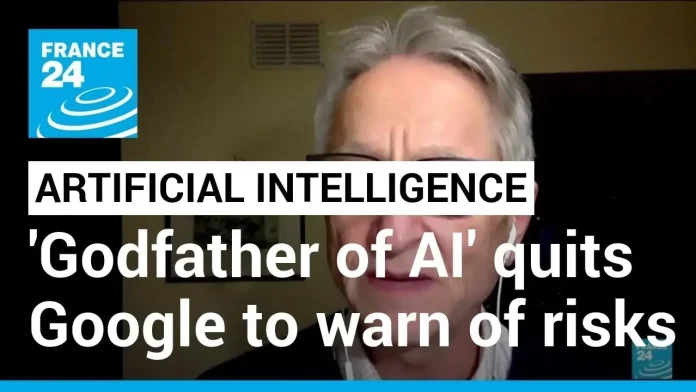Picture this: Geoffrey Hinton—the brilliant mind behind neural networks—tells you your white‑collar gig is toast, but says plumbing is your new BFF.
No joke: the man who built AI warns most office jobs will vanish…unless you’re wielding a wrench.
Think of it as AI’s cold-hearted swipe-right on IQ, and swipe-left on human labor.
But beneath the humor lies a serious truth: our work lives are teetering, and only a few roles can truly survive.
| Aspect | Key Details |
|---|---|
| Who? | Geoffrey Everest Hinton (b. 1947), British‑Canadian computer scientist, Nobel laureate, pioneer of deep learning |
| What? | Warns AI will wipe out mundane intellectual labor—paralegals, call center agents, data entry clerks are high‑risk. Physical‑trade jobs like plumbing remain safer |
| Where & When? | On June 16 on the ‘Diary of a CEO’ podcast; widely covered since mid‑June 2025 |
| Why It Matters | Signals massive workplace disruption, greater inequality, existential risk—and even proposes universal basic income as a stopgap |
| Net Worth? | His wealth is modest by tech‑elite standards—estimated between US 5–10 million, with some assets pegged closer to US 30 million |
Deep Dive: What People Are Searching
1. Which jobs will AI kill first?
- High-risk roles: Paralegals, data‑entry clerks, call‑center staff—jobs revolving around mundane intellectual labor
- Why? AI can easily replicate tasks that follow predictable patterns or lettered logic.
2. What jobs are safe—for now?
- Plumbing (and other physical-trade roles) top the list. It “will be a long time” before AI handles real-world manual work
- Healthcare, especially hands-on care: demand outpaces AI’s reach.
3. Will AI create new jobs to replace losses?
Hinton said probably not enough. While some roles may become AI‑assisted, that often means fewer workers doing more—one human plus AI can do the job of ten.
4. What’s this about Universal Basic Income (UBI)?
He supports UBI as a buffer against rising unemployment, but warns it doesn’t solve humans losing purpose when work disappears
5. How rich is the AI Godfather?
- Estimated net worth: tech‑elite modest—US 5–10 million
- Another source claims closer to US 25–30 million, factoring in royalties, consulting, and past Google deals
- Widely lauded academically—Nobel in Physics (2024) and Turing Award (2018)
“For mundane intellectual labour, AI is just going to replace everybody.”
“I’d be terrified if I had a job as a call‑centre operator.”
“It’s going to be a long time before AI is as good at physical manipulation…so a good bet would be to be a plumber.”
Broader Context: Societal Impacts
- Mass displacement: Already noticeable—SignalFire reports 25% fewer graduate hires in 2024 at major tech firms. Banks trimming staff (Morgan Stanley, Citi, JPMorgan) with AI systems stepping in .
- Economic inequality: Hinton warns AI could deepen social divides unless mitigated
- Existential risk: Echoing concerns about AGI—Hinton fears superintelligent AI may surpass humans in every domain, not just jobs .
- Regulation & ethics: His 2023 resignation from Google highlighted calls for careful oversight of AI’s development and possible misuse
Survival Checklist: How to Stay Relevant
- Master hands-on/manual trades – plumbing, electrical, carpentry.
- Upskill intellectually – creative thinking, complex problem-solving, emotional intelligence.
- Go human in human‑AI teams – work with AI, not against it.
- Support policy shifts – advocate for UBI, retraining programs, adaptive education.
FAQ Table:
| Question | Answer |
|---|---|
| Which roles are most vulnerable? | Paralegals, call‑center, data‑entry, basic white‑collar jobs |
| Are plumbers truly safe? | Yes—physical, unpredictable manual tasks are far from AI’s current strengths |
| Can AI create enough new jobs? | Skeptical—Hinton believes AI will cause net job reduction even with AI-augmented roles |
| Is UBI a silver bullet? | No—but it’s a vital support; emotional fulfillment from purposeful work still matters |
| Hinton’s net worth? | Between US 5–10 million—some estimates up to US 30 million |
| Does AI threaten human existence? | He warns superintelligent AI may pose deep long-term risks |
The Big Picture
- AI will outperform us in repetitive mental tasks—possibly in manual tasks soon too.
- Human value lies in creativity, empathy, dexterity—skills machines can’t replicate easily.
- Policy must adapt: Universal basic income, mass retraining, regulated AI development.
- Education should evolve from rote and routine to critical thinking and hands-on learning.
Geoffrey Hinton—the mind behind deep learning—gives a sobering wake-up call: Much of what we do for a living today may disappear. But for those willing to pivot:
plumbing, caregiving, creative work, skilled trades offer a path forward.
And societies must act now—through policy, education, and investment—to navigate the AI revolution, not just survive it.

